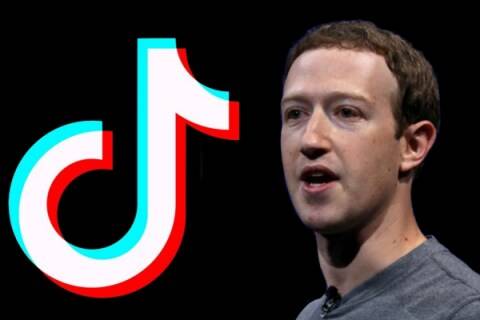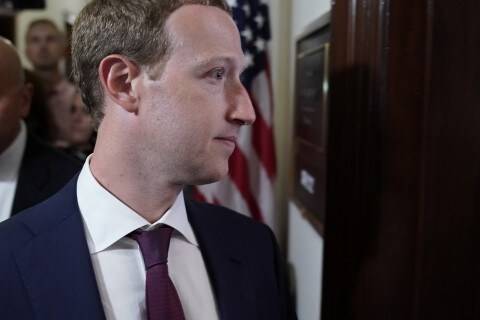Analysis | The Technology 202: A President Elizabeth Warren is starting to worry top tech titans – The Washington Post

Democratic presidential candidate Sen. Elizabeth Warren (Mass.) speaks at a campaign event on Friday in Hollis, N.H. (Cheryl Senter/AP)
Ctrl + N
Silicon Valley’s top brass thought they had a big problem when Donald Trump was elected to the White House. His immigration plans, vows to return manufacturing jobs to American shores and pointed threats directed at individual companies roiled the tech elite.
But a President Elizabeth Warren could also be a complicated commander-in-chief for Silicon Valley. Facebook chief executive Mark Zuckerberg is predicting a Warren presidency would draw Facebook into a legal battle with the U.S. government.
“You have someone like Elizabeth Warren who thinks that the right answer is to break up the companies … if she gets elected president, then I would bet that we will have a legal challenge, and I would bet that we will win the legal challenge,” Zuckerberg said at a July company meeting, according to a recording obtained by the Verge’s Casey Newton. “And does that still suck for us? Yeah. I mean, I don’t want to have a major lawsuit against our own government. … But look, at the end of the day, if someone’s going to try to threaten something that existential, you go to the mat and you fight.”
Zuckerberg’s harsh words leaked to the public as Warren continues to gain in the Democratic primary, making it increasingly likely she could face off with Trump in the fall. That could be bad news for tech company executives, who are the target of many of her most aggressive plans.
Warren was the first 2020 presidential candidate to release a comprehensive plan to break up the tech companies, which has since been adopted by many other top 2020 contenders. She has bashed Silicon Valley for abusing people’s privacy and endangering democracy during elections. Her proposals for a wealth tax on the country’s highest earners would undoubtedly personally hit some prominent tech executives. And in the wake of Zuckerberg’s comments, she’s only stepped up her jabs at the companies. From her Twitter feed:
Warren’s attacks on the tech industry underscore how her candidacy is dividing Silicon Valley, especially after the tech industry has largely been united behind candidates like President Obama and Hillary Clinton in recent election cycles.
Warren’s aggressive antitrust and tax plans could pose a major problem for top company executives who would find themselves increasingly under Washington’s microscope in a Warren administration. It’s also unclear if Warren can garner broad support among venture capitalists in the industry. As Paul Graham, the co-founder of the startup accelerator Y Combinator, wrote, most don’t agree with her antitrust plans:
Warren has already shown that she can garner some support among rank-and-file tech employees. The San Jose Mercury News reported that Warren came in second in donations over a three-month period between April and the end of June from employees at Amazon, Google, Apple, Facebook and Google’s parent company Alphabet, trailing only Indiana Mayor Pete Buttigieg. She also led the field in donations from people who described their job as “software engineer” or “programmer.”
Max Kaehn, a Google software engineer who donated to Warren’s campaign, told me that he thinks she has the most comprehensive policies addressing issues like health care. He also thinks that engineers like himself stand to benefit from Warren’s antitrust policies.
“Creating more competition is good for software engineers because it means we have more potential jobs to go to,” he told me.
He’s been working in Silicon Valley for 25 years, and he feels these days, there isn’t enough innovation. Kaehn says so much focus is on the biggest tech companies, and many of the startups are just trying to get acquired by the bigger players.
“These days all I get contacted for are companies doing calendaring or self-driving cars, ” he said. “They’re obviously attempts to create a unicorn that gets acquired by one of the big tech companies.”
For other tech employees, supporting Warren remains a complicated decision. From Adrienne Porter Felt, a Google Chrome engineer, on Twitter:
BITS, NIBBLES AND BYTES

GOP symbol. (Erika P. Rodriguez for The Washington Post)
BITS: A new incubator focused on tech for conservative campaigns is investing $150,000 across six start-ups focused on digital tools for analytics, outreach and organizing.
Startup Caucus’s inaugural investments include: Numinar, Voterfied, Buzz360, Trailmapper, Pundit and Voter Science, the incubator’s managing partner Eric Wilson told The Technology 202 exclusively. The founders of the companies will also participate in 12 weeks of training and networking with Republican political operatives and funders.
“Republicans have a big advantage when it comes to the top of the ticket. We’re outperforming Democrats online. But we need to keep up the innovation,” says Wilson, a longtime GOP digital strategist.
The companies will focus on local, state and congressional races. While many address the same issues facing campaigns across the political spectrum, some have a uniquely conservative bent. Voterfied, run by a former congressional candidate, will focus on giving candidates a direct platform to reach voters about more localized issues that might not get media pickup. Another, Pundit, will serve as a social-media network for voters. Both could appeal to conservatives who allege Big Tech and mainstream media outlets are biased against them.
Startup Caucus is Republicans’ answer to Higher Ground Labs, an incubator that backs political start-ups who want to assist progressive campaigns. But there’s one key difference: operating budget. Startup Caucus has about a tenth of the funding of its liberal rival.
“I’m confident once we have this portfolio out in the world, and people see the innovation from Startup Caucus, that money will be coming,” Wilson tells me.
Startup Caucus has an edge with an advisory committee full of a veritable Who’s Who of Republicans in tech, including Ginny Badanes, director of Microsoft’s Defending Democracy Program, and Matt Oczkowski, president of behavioral targeting firm Data Propria.
Oszkowski, one of the right’s biggest tech stars, comes with significant baggage. He previously worked at Cambridge Analytica, the now- shuttered firm that worked for the Trump campaign and siphoned raw data from 50 million Facebook users. But Wilson said the blowback following the incident hasn’t made candidates gun-shy about taking on data-driven tech.
“We expect that all of our companies follow the law and best practices when it comes to using and storing data, especially when they’re providing insights to campaigns,” Wilson says. “But I don’t think any fallout from Cambridge Analytica has dampened campaigns’ enthusiasm for cutting-edge campaign tech.”
NIBBLES: A federal appeals court upheld the Federal Communications Commission’s 2017 decision to roll back Obama-era net neutrality rules. But the court’s decision could still give consumer advocates and tech companies a path forward because it overruled the FCC’s effort to block local and state open Internet legislation, my colleague Tony Romm reports.
“The bright silver lining, however, is that the ruling bolsters existing state efforts to restore net neutrality, and gives a greenlight for other states to join those efforts,” Chad Marlow, senior advocacy and policy counsel at the ACLU, said in a statement. “We will continue to work with governors and state legislatures across the country for a fair, free, and open Internet.”
Yesterday’s court decision makes it clear the FCC overstepped when it added a directive in its 2018 resolution saying the agency’s decision would preempt state laws. The ruling could make it easier to pass net neutrality legislation in 29 states where such bills are pending. California, which put its net neutrality law on hold pending the outcome of yesterday’s trial, will now move forward with a court challenge from the Justice Department over whether its law conflicted with federal regulations.
Sen. Ron Wyden (D-Ore.) also pushed for states to keep leading the open Internet fight. Oregon passed its own net neutrality law in 2018.
Author Tim Wu pointed out, however, that making California the face of net neutrality just adds to the laundry list of tech issues the state seems to be tackling before Congress.
Net neutrality could still see its day in Washington, however. House Energy and Commerce Committee Chairman Frank Pallone Jr. (D-N.J.) and Communications and Technology Committee Chairman Mike Doyle (D-Pa.) reiterated their call for the Senate to take up legislation to restore net neutrality — which has languished since passing the House in April.

Amazon warehouse. (Carlos Jasso/Reuters)
BYTES: Amazon sellers and former employees allege that Amazon’s dual role as marketplace and retailer has allowed it to profit off sellers while directing sales to its own products, my colleague Jay Greene reports. Many of the sellers have shared their frustrations with the Federal Trade Commission, potentially serving as powerful evidence as federal regulators investigate the retail giant for potentially anti-competitive behavior
Amazon made $42.7 billion off seller services last year, more than double than what it brought in two years ago. Sellers attribute part of the growth to increased costs of advertising. “If you don’t advertise, you lose organic sales,” Jason Boyce, a onetime merchant on Amazon who is now a consultant to those third-party sellers, told Jay.
Moreover, sellers claim that Amazon prioritizes its growing collection of house-brand items over seller offerings. The company has also been accused by European Union regulators of using data collected from its sales to help its own brands, a potential violation of antitrust law U.S. regulators could drill into.
Company spokesman Jack Evans denied the characterization and said that many seller fees are optional — and some have been recently lowered. (Amazon CEO Jeff Bezos owns The Washington Post.)
PRIVATE CLOUD
— News from the private sector:
Visa, Mastercard, Others Reconsider Involvement in Facebook’s Libra Network
Cracks are forming in the coalition Facebook assembled to build a global cryptocurrency-based payments network.
Wall Street Journal
Zuckerberg misunderstands the huge threat of TikTok
“It’s almost like the Explore Tab that we have on Instagram” said Facebook CEO Mark Zuckerberg in leaked audio of him describing TikTok during an all-hands meeting. But it’s not. TikTok represents a new form of social entertainment that’s vastly different from the lifeloggin…
TechCrunch
Facebook’s Voter Turnout Machine Could Be Trump’s Secret Weapon In 2020
As leaked audio shows Mark Zuckerberg worrying about Sen. Elizabeth Warren, the site’s “I Voted” button could help tip the election for the president or another candidate.
BuzzFeed News
PUBLIC CLOUD
— News from the public sector:
Congress and Trump Agreed They Want a National Privacy Law. It Is Nowhere in Sight.
Even amid a bipartisan backlash against tech companies, lawmakers have struggled to channel that into a federal privacy law.
The New York Times
DNC accuses Facebook of allowing Trump ‘to mislead the American people’
The Democratic National Committee (DNC) is accusing Facebook of allowing President Trump to “mislead the American people” without facing any consequences.
The Hill
It’s about to get a lot easier to repair old appliances in the EU
Manufacturers will need to make spare parts available for up to a decade.
The Verge
FAST FWD
Amazon workers in Sacramento are protesting the company’s strict time-off rules
Part-time employees get no medical benefits and are allowed only short periods of unpaid time off.
The Verge
Tesla Makes the Industry’s Safest Cars in One of its Most Dangerous Factories
A judge has found Elon Musk in violation of labor law numerous times. This makes sense considering how unsafe his factory is.
Edward Ongweso Jr
#TRENDING
— Tech news generating buzz around the Web:
Teen Hackers Try to Convince Parents They Are Up to Good
Teenagers across the country are forming hacking clubs and trying to spread the word that hacking doesn’t always mean breaking into government servers or stealing bank data. Convincing teachers and parents of that isn’t always easy.
Wall Street Journal
The Tech Helping Dogs Learn to ‘Talk’ With Humans
Using nose-activated vests and touchscreens, our canine pals are being trained to summon help for their handlers—and much more.
Wired
Where Toxic Masculinity Goes to Die
Beard Board offers a rare avenue for constructive aesthetic feedback among men—minus the machismo that often accompanies it.
The Atlantic
Here She Is, the Safest Driver in Los Angeles
She got the prize for being the most competent navigator in L.A. If you’re willing to let insurance companies spy on you, it can pay off for you too.
The New York Times
CHECK-INS
— Coming up:
- TechCrunch Disrupt SF will take place Oct. 2-4.
- The House Energy and Commerce Committee will host a hearing to discuss the pros and cons of Section 230 of the Communications Decency Act on Oct. 16.
WIRED IN
Head of Instagram Adam Mosseri tells the TODAY Show that breaking up Facebook’s properties would make it “much more difficult” for Instagram to do “meaningful work” when it comes to issues like election content.
PODCAST: Uber says safety is its first priority. Employees aren’t so sure.
Greg Bensinger on Uber’s company-centric safety policies.
The Washington Post



















